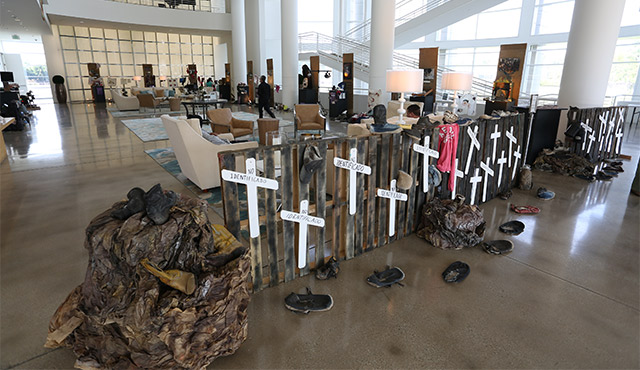For 11 years, Deborah McCullough has walked the dangerous and steep trails walked by migrants in Southern Arizona.
In 2013, at an immigration summit held by the Diocese of Tucson, Arizona, she was invited to create an exhibit. Three attendees from the Diocese of Los Angeles saw this exhibit and working with them they created “A Journey of Hope: Via Crucis.” It was first shown at the Religious Education Congress, 2014 and has been shown in Los Angeles and Tucson since then.
During Lenten season and Year of Mercy, McCullough is presenting “A Journey of Hope Along the Migrant Trail: A Via Crucis Migrante” (Migrant Stations of the Cross) at the Christ Cathedral Cultural Center Feb. 26 to March 6.
“I hope my art provokes discussion around the issue of immigration, of the why, the how and the human factors involved,” she said. “It is my objective to create a bridge between the rhetoric and the politics of a political issue and the human faces and the human ordeals people actually face on a daily basis. I hope to change hearts and to provoke action.”
The impressive exhibit was created with sacred artifacts found along the U.S.-Mexico border. These unique stations form a powerful, prayerful encounter that brings to light the plight of migrants, refugees and those who inhabit the margins of the society.
Dirty tennis shoes in poor conditions, traces of blood on the soles of feet, letters, pictures, written prayers, messages, toothbrushes, blankets, school bags, and crosses are among those many forgotten items along the way by those migrants who were injured or killed in their attempt to cross the U.S.-Mexico border.
“The most difficult thing for me to understand about what is happening along the US-Mexico border is the lack of awareness that the suffering continues daily.” McCullough said. “In spite of the decrease in apprehensions and deportations, the number of deaths occurring remains about the same year in and year out. I am frustrated by the unwillingness to move forward with even discussing immigration reform by politicians in Washington.”
As an artist working in this field, McCullough believe it is essential to her message and to her artwork, to go into the desert often, to walk the trails and be active in the Tucson Samaritans who go into the desert daily looking for travelers who are lost or have been left behind. Over the years she has continued to study Spanish and traveled to Mexico, Guatemala, El Salvador and Colombia, learning all she can about the issues that lead people to decide they must move North.
Deborah McCullough had walked hundreds of miles of trails over the years. She has found countless objects and been moved and haunted by the faces she have seen, the blistered feet she has bandaged and the stories she have heard.
“I have learned from all of this that all human beings deserve dignity, kindness and humane treatment.” She said. “The people who walk these trails have the same hopes and dreams I have. They want better lives for themselves and their families, they want to be free from fear and oppression and they want to laugh, love and live their lives. These objects tell me we must continue to work for immigration reform that will bring our brothers and sisters out of the shadows and away from the margins of our society.”
“By touching these items with our hands we touch our own soul,” said Giovanni Perez, Consultant for Elementary Catechesis at the Office of Religious Education of the Archdiocese of Los Angeles. “One of those migrants are us.”
The exhibit occurs during the Lenten season and Year of Mercy and immediately follows Pope Francis’s historic recent visit to Mexico. People are invited to share this event and invite guests to visit. Prayer/exhibit guides are available in English, Spanish and Vietnamese.
The Fourteen Stations of “A Journey of Hope Along the Migrant Trail: A Via Crucis” are:
First Station: Poverty Imposes the Cross of Migration
Second Station: Stranger in a Strange Land
Third Station: Human Rights Ignored
Fourth Station: Mother of Sorrows, the Sorrows of Women
Fifth Station: Arrested and Helpless
Sixth Station: Veronica; the Woman with Humanitarian Aide
Seventh Station: Falls
Eight Station: Jesus and the Women
Ninth Station: The Suffering Jesus
Tenth Station: Another Fall
Eleventh Station: Denial and Stripping Away Human Rights
Twelfth Station: Death through Crucifixion
Thirteenth Station: Compassion
Fourteenth Station: Hope Endures
For more information or to schedule a large group visit, please call 714-282-3035 or email [email protected].

